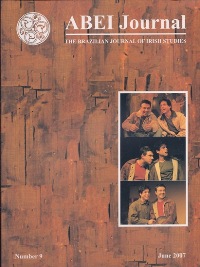Beyond the Accent Limitations: Staging Marie Jones’s Stones in His Pockets to a Brazilian Audience
DOI:
https://doi.org/10.37389/abei.v9i0.3697Palavras-chave:
Marie Jones, Stones in His Pockets, Translation, Cia LudensResumo
At first sight one might suppose that it would be almost impossible to stage Marie Jones’s Stones in His Pockets successfully in any other language but English. As the primary idea of the play is to exploit English accents in order to delineate the characters’ social roles as well as their national conflicts, any attempt to reproduce a similar situation in Brazil, a country of continental proportions and therefore with a myriad of accents, would have led us to a biased and prejudiced approach: the Brazilian political and social reality is, in many aspects, radically distinct from the one depicted by the Irish playwright. Nevertheless, when the accent limitations were given less emphasis and the translator focused on the structure of the play, entirely based on American film clichés, it was possible to establish a great number of similarities between a Brazilian and an Irish environment. The Hollywood industry model as a
prototype to discuss colonizing processes, an imposed hegemony and
hierarchical systems of the power turned out to be very revealing and
meaningful to a contemporary Brazilian audience. The main purpose of this communication is to present the options taken in the process of translation and discuss the subsequent solutions for the stage production in Brazil and how they reverberated not only in conceptual terms, but also in the reception of the play.


